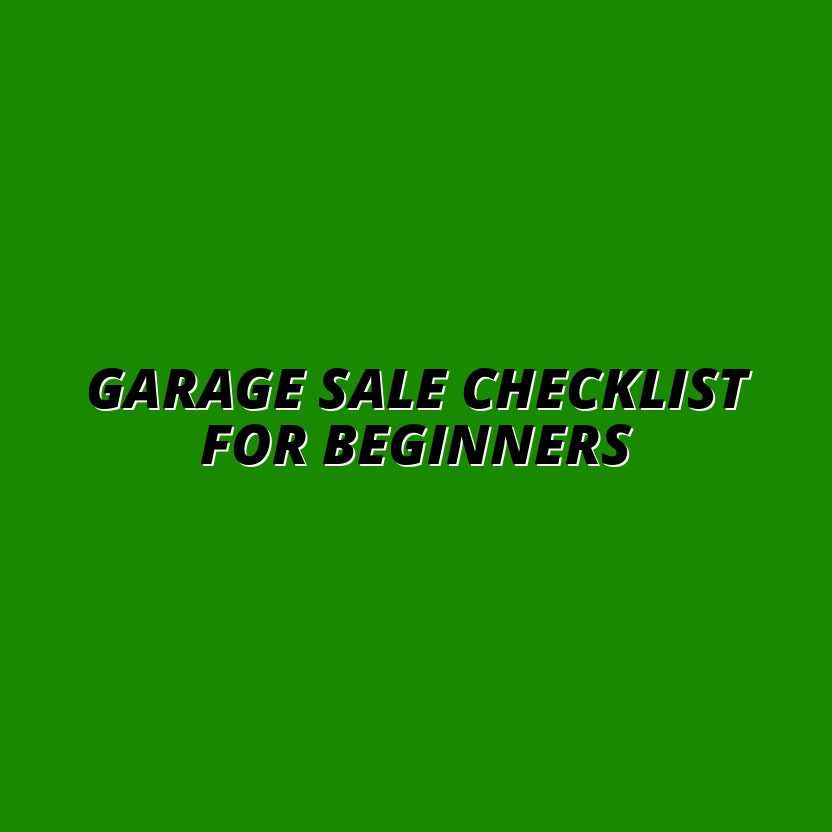Sep 15
Garage Sale Checklist for Beginners
Have you ever felt overwhelmed by clutter, wondering how to turn it into cash? Hosting a garage sale can transform your unwanted items into a rewarding experience. Let’s explore the essential steps to ensure your first sale is a success!

What You Will Learn
- Planning is crucial for a profitable garage sale, helping to organize tasks and attract more customers.
- Create a comprehensive checklist to streamline your preparation process, ensuring no detail is overlooked.
- Choosing the right date and time, preferably weekends, can significantly increase attendance at your sale.
- Understanding local ordinances and obtaining necessary permits is essential to avoid fines and disruptions during your sale.
- Implement post-sale strategies like donating unsold items or listing them online to maximize your efforts.
- Tracking your earnings and reflecting on your experience can provide valuable insights for future sales.
Essential Steps for a Successful Garage Sale
Here are key considerations for first-time sellers preparing for their garage sale, presented visually for clarity.
Planning Importance
- Systematically declutter and prepare items for sale.
- Attract more customers with targeted advertising.
- Create a positive shopping experience.
Comprehensive Checklist
- Choose a date and time for your sale.
- Gather items and assess their condition.
- Create a pricing strategy.
- Draft a promotional plan.
- Prepare necessary supplies.
Timing Tips
- Schedule your sale early in the day.
- Consider local events or holidays.
- Check the weather forecast.
Post-Sale Strategies
- Donate unsold items to local charities.
- List online on platforms like Facebook Marketplace.
- Host another sale if necessary.
- Repurpose items into new creations.

Preparing for Your Garage Sale: Essential Steps for First-Time Sellers
Have you decided to take the plunge and host your very first garage sale? That’s fantastic! Preparing for a successful garage sale is all about planning and organization. As someone who has been in your shoes, I understand the excitement and the jitters that come with it. A well-prepared garage sale can turn your clutter into cash and create a rewarding experience for both you and your buyers!
To help you kick off your journey, let’s explore the essential steps you need to take to set yourself up for success. Planning is key, and with the right approach, you can attract a steady stream of buyers eager to find treasures among your items. For additional insights, you might find resources like this guide from the National Association of Realtors helpful, offering tips on how to maximize your sale’s potential.
Understanding the Importance of Planning a Successful Garage Sale
Planning is not just a good idea; it’s crucial for a profitable garage sale. Without a solid plan, you might find yourself overwhelmed by last-minute tasks or left with unsold items. Here are a few reasons why planning matters:
- It helps you systematically declutter and prepare your items for sale.
- Effective planning allows you to attract more customers with targeted advertising.
- A well-organized sale creates a positive shopping experience, increasing the likelihood of sales.
By taking the time to plan, you set the foundation for a successful event that not only meets your financial goals but also encourages a fun atmosphere for buyers.
Creating a Comprehensive Garage Sale Checklist for Effective Organization
Having a comprehensive checklist can streamline your preparation process. Here’s a quick guide to get you started: You can also find a free printable garage sale prep kit online to help with organization.
- Choose a date and time for your sale.
- Gather items to sell and determine their condition.
- Create a pricing strategy for your items.
- Draft a promotional plan to advertise your sale.
- Prepare necessary supplies (tables, signs, bags, etc.).
With this checklist, you’ll be able to tackle your tasks efficiently. Trust me, checking off each item will not only keep you organized but also boost your confidence as the sale day approaches!
Frequently Asked Questions (FAQs)
- Why is planning important for a garage sale?
- Planning helps you declutter, attract more customers through targeted advertising, and create a positive shopping experience, leading to a more profitable sale.
- What should be included in a garage sale checklist?
- Your checklist should include choosing a date and time, gathering items, creating a pricing strategy, drafting a promotional plan, and preparing necessary supplies.
- What is the best time to schedule a garage sale?
- Weekends are generally best, starting early in the day (around 8 AM), while also considering local events and weather forecasts.
- What should I do with unsold items after the garage sale?
- Consider donating items to local charities, listing them online, hosting another sale, or repurposing them.
- Why is it important to track earnings and reflect on the experience?
- Tracking earnings and reflecting on the experience provides valuable insights into what sold well, buyer feedback, and areas for improvement in future sales.
Choosing the Right Date and Time for Maximum Attendance
Timing can make or break your garage sale! Selecting the right date and time is essential for attracting a crowd. Typically, weekends are the best, as more people are free to browse. Here are a few tips to consider:
- Schedule your sale early in the day, preferably starting around 8 AM.
- Consider local events or holidays that may impact attendance.
- Check the weather forecast to avoid rainy days.
By strategically choosing your date and time, you’ll increase your chances of drawing in potential buyers and making those sales!
Obtaining Necessary Permits and Complying with Local Ordinances
Before you set up your garage sale, make sure you’re familiar with local ordinances. Some areas may require you to obtain a permit for selling items, especially if you’re planning a large sale. Here’s how to navigate this:
- Check with your local city or town hall for permit requirements.
- Understand any restrictions on signage or sale hours.
- Be aware of any neighborhood association rules that might apply.
Following these guidelines ensures that you avoid any fines or disruptions on sale day. It’s all about creating a smooth and enjoyable experience for you and your customers!
Pro Tip
As you prepare for your garage sale, consider offering bundled deals. For example, if you have several books, you could sell them as a "buy two, get one free" package. This not only encourages buyers to purchase more but also helps you clear out items faster. Additionally, it creates a sense of value, making customers feel they’re getting a great deal!
Wrapping Up: What to Do After Your Garage Sale
Congratulations on completing your garage sale! Now comes the crucial part: what to do with the items that didn’t sell and how to reflect on your experience. I can’t stress enough how important it is to have a clear plan in place for these unsold items. After all, the goal is to maximize your time and profits while minimizing clutter in your space! For additional resources, consider exploring guides from sources like Extra Space Storage which offers comprehensive tips on preparing for a garage sale.
Let’s dive into some effective post-sale strategies that can help you manage unsold items while ensuring you get the most out of your garage sale experience.
Post-Sale Strategies: Managing Unsold Items Effectively
After the hustle and bustle of your sale, it’s time to evaluate what remains. Here are some practical options to handle unsold items:
- Donate: Consider donating items to local charities or thrift stores. This not only helps those in need but also supports sustainability.
- List Online: Use platforms like Facebook Marketplace or Craigslist to list your unsold goods. You’d be surprised how quickly they can find a new home!
- Host Another Sale: If you still have significant inventory, think about hosting another sale in the future. Each sale is a learning experience!
- Repurpose: Get creative! Some items can be upcycled or refurbished. Turn old furniture into trendy decor pieces!
By implementing these strategies, you can ensure that your garage sale efforts don’t go to waste. Remember, every item has potential; it just needs to find the right buyer or purpose!
Tracking Earnings and Reflecting on Your Experience for Future Sales
Don’t forget to track your sales! Keeping a record of what sold, what didn’t, and your overall earnings can provide invaluable insights for your next sale. I recommend setting aside time to reflect on your experience. Here are a few questions to consider:
- What items sold the best? Why do you think that is?
- Did you receive any feedback from buyers that could guide your future sales?
- Were there any challenges you faced that you can improve upon next time?
Reflecting on these elements will help you tailor your approach for future sales. As someone who’s been in your shoes, I can tell you that each garage sale is a chance to refine your strategy and boost your profits!
Considering Donation Options: Embracing Sustainability
One of the best things about hosting a garage sale is the opportunity to give back to your community. Donating unsold items not only helps others but also keeps our planet in mind. Many local charities are always in need of household goods, clothing, and toys. Plus, you might even qualify for a tax deduction!
Before you donate, make sure to check the guidelines for accepted items. Many organizations have specific needs, and it’s always best to support them with items they can use. You’re not just decluttering; you’re making a positive impact!
Recap of Key Points
Here is a quick recap of the important points discussed in the article:
- Planning is crucial for a successful garage sale to help manage tasks and attract buyers.
- Create a comprehensive checklist that includes choosing a date, gathering items, pricing, and promotional strategies.
- Select the right date and time, preferably on weekends and early in the day, to maximize attendance.
- Ensure compliance with local ordinances and obtain necessary permits to avoid issues on sale day.
- After the sale, consider donating unsold items, listing them online, or hosting another sale to manage remaining inventory.
- Track your earnings and reflect on your experience to improve future sales.

Elena Foster
Seasoned entrepreneur. Expert in garage sales & classified ads. Passionate about empowering others.
Elena Foster is dedicated to transforming clutter into cash, empowering side hustlers and entrepreneurs to embrace a profitable selling strategy. Join her on our blog for daily tips and tailored strategies that simplify your selling journey and enhance your income potential.


